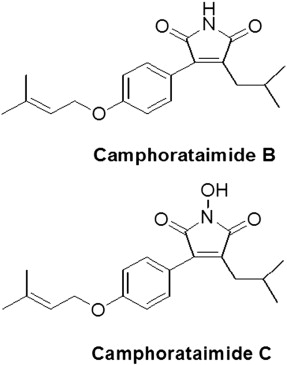
來自臺灣的文獻:合成的樟芝菌絲體中馬來酸衍生物是否可以抑制乳癌細胞增生
Lin WL; Lee YJ; Wang SM; Huang PY; Tseng TH
Department of Pathology, Chung Shan Medical University Hospital, No. 110, Section 1, Chien-Kuo N. Road, Taichung 402, Taiwan.
Both mycelium and fruiting body of Antrodia camphorate, a traditional medicinal fungus of the family Polyporaceae in Taiwan, have been suggested to possess multiple biological functions. However, there is little information on the anticancer components and actions of mycelium of Antrodia camphorate. In the present study, the anticancer potential of synthesized maleimide derivatives, which have been isolated from mycelium of Antrodia camphorate, is examined. Comparing the cytotoxicity of two synthesized maleimide derivatives in four human cancer cell lines, camphorataimide B displayed potent efficacy. Then we investigated the impact of camphorataimide B on cell survival and cell cycle progression in vitro, and tumor growth in vivo in MDA-MB-231 breast cancer cells. Camphorataimide B decreased the cell viability and foci formation of MDA-MB-231 breast cancer cells. Further, camphorataimide B triggered apoptosis and blocked cell cycle progression of MDA-MB-231 breast cancer cells. Using immunoblotting analysis, camphorataimide B decrease the expression of cyclin-A and cyclin-B1. Moreover, we demonstrated for the first time that camphorataimide B inhibited cyclooxygenase-2 (COX-2) activity and protein expression in MDA-MB-231 cells. In nude mice study, camphorataimide B administration retarded the xenograft tumor growth of MDA-MB-231 cells. By immunohistochemical analysis, camphorataimide B decreased the expression of Ki-67 in xenograft tumor in vivo. It implied that camphorataimide B blocked cell cycle progression. Consistent with the cell culture investigation, camphorataimide B also reduced the expression of cyclin-A, cyclin-B1 and COX-2 in xenograft tumor. Thus, camphorataimide B may play a crucial role in prevention and therapy of malignant breast cancer.





 留言列表
留言列表
 線上藥物查詢
線上藥物查詢 